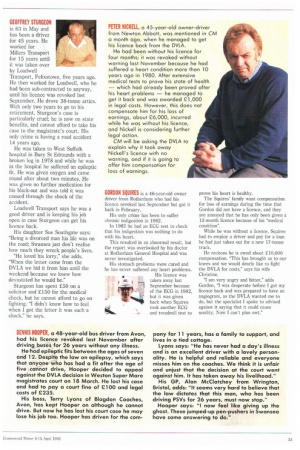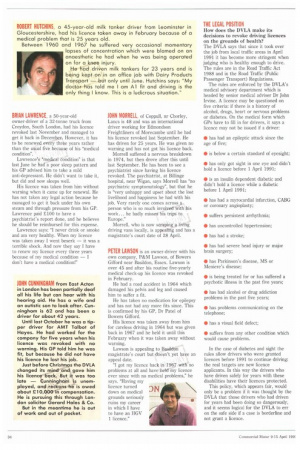GEOFFREY STURGEON is 63 in May and has been a
Page 35

Page 36

If you've noticed an error in this article please click here to report it so we can fix it.
driver for 45 years. He worked for Millers Transport for 15 years until it was taken over by Loadwell Transport, Felixstowe, five years ago. He then worked for Loadwell, who he had been sub-contracted to anyway, until his licence was revoked last September. He drove 38-tonne artics. With only two years to go to his retirement, Sturgeon's case is particularly cruel; he is now on state benefits, and cannot afford to take his case to the magistrate's court. His only crime is having a road accident 14 years ago.
He was taken to West Suffolk hospital in Bury St Edmunds with a broken leg in 1978 and while he was in the hospital he suffered an epileptic fit. He was given oxygen and came round after about two minutes. He was given no further medication for his black-out and was told it was caused through the shock of the accident.
Loadwell Transport says he was a good driver and is keeping his job open in case Sturgeon can get his licence back.
His daughter Sue Southgate says: "Being a divorced man his life was on the road; Swansea just don't realise how much they wreck people's lives.
"He loved his lorry," she adds. "When the letter came from the DVLA we hid it from him until the weekend because we knew how devastated he would be."
Sturgeon has spent £50 on a solicitor and £150 for the medical check, but he cannot afford to go on fighting. "I didn't know how to feel when I got the letter it was such a shock," he says. GORDON SQUIRES is a 46-year-old owner driver from Rotherham who had his licence revoked last September but got it back in February.
His only crime has been to suffer chronic indigestion in 1982.
In 1982 he had an ECG test to check that his indigestion was nothing to do with his heart.
This resulted in an abnormal result, but the report was overlooked by his doctor at Rotherham General Hospital and was never investigated.
His stomach problems were cured and he has never suffered any heart problems.
His licence was taken away last September because of the ECG in 1982, but it was given back when Squires took another ECG and treadmill test to The Squires' family want compensation for loss of earnings during the time that Gordon did not have a licence, and they are annoyed that he has only been given a 12-month licence because of his "medical condition".
While he was without a licence, Squires had to employ a driver and pay for a loan he had just taken out for a new 17-tonne truck.
He reckons he is owed about £10,000 compensation. "This has brought us to our knees and we would dearly like to fight the DVLA for costs," says his wife Christine.
"1 am very angry and bitter," adds Gordon, "I was desperate before I got my licence back and was prepared to have an angiogram, as the DVLA wanted me to do, but the specialist I spoke to advised against it saying that it could cause senility. Now I can't plan owt." BRIAN LAWRENCE, a 50-year-old owner-driver of a 32-tonne truck from Croydon, South London, had his licence revoked last November and managed to get it back in December. However, it has to be renewed every three years rather than the usual five because of his "medical condition".
Lawrence's "medical condition" is that last June he had a poor sleep pattern and his GP advised him to take a mild anti-depressant. He didn't want to take it, but did and now sleeps well.
His licence was taken from him without warning when it came up for renewal. He has not taken any legal action because he managed to get it back under his own steam and through pressure from his GP. Lawrence paid £100 to have a psychiatrist's report done, and he believes he should be reimbursed for this expense.
Lawrence says: "1 never drink or smoke and am very healthy. When my licence was taken away I went beserk — it was a terrible shock. And now they say I have to renew my licence every three years because of my medical condition — I don't have a medical condition!" JOHN MORRELL, of Coppull, nr Chorley, Lanes is 48 and was an international driver working for Edmondson Freightliners of Morecambe until he had his licence revoked last September. He has driven for 25 years. He was given no warning and has not got his licence back.
Morrell suffered a nervous breakdown in 1974, but then drove after this until last September. He has been to see a psychiatrist since having his licence revoked. The psychiatrist, at Billinge hospital, near Wigan, says Morrell has "no psychiatric symptomatology", but that he is "very unhappy and upset about the lost livelihood and happiness he had with his job. Very rarely one comes across a person who is so much involved with his work.., he badly misses his trips to Europe."
Morrell, who is now scraping a living driving vans locally, is appealing and has a magistrate's court date of 28 April.
PETER LAWSON is an owner-driver with his own company, P&M Lawson, of Bowers Gifford near Basildon, Essex. Lawson is over 45 and after his routine five-yearly medical check-up his licence was revoked in February.
He had a road accident in 1964 which damaged his pelvis and leg and caused him to suffer a fit.
He has taken no medication for epilepsy and has not had any more fits since. This is confirmed by his GP, Dr Patel of Bowers Gifford.
His licence was taken away from him for careless driving in 1964 but was given back in 1967 and he held it until this February when it was taken away without warning.
Lawson is appealing to Basildon magistrate's court but doesn't yet have an appeal date.
"I got my licence back in 1967 with no problems at all and have held my licence ever since with no medical problems," he says. "Having my licence turned down on medical grounds seriously ruins my career in which I have to have an HGV 1 licence."
THE LEGAL POSITION
How does the DVLA make its decisions to revoke driving licences on the grounds of health?
The DVLA says that since it took over the job from local traffic areas in April 1991 it has become more stringent when judging who is healthy enough to drive. The rules are in the Road Traffic Act 1988 and in the Road Traffic (Public Passenger Transport) Regulations.
The rules are enforced by the DVLA's medical advisory department which is headed by senior medical adviser Dr John Irvine. A licence may be questioned on five criteria: if there is a history of alcohol, drugs, heart or nervous problems or diabetes. On the medical form which GPs have to fill in for drivers, it says a licence may not be issued if a driver:
In the case of diabetes and sight the rules allow drivers who were granted licences before 1991 to continue driving: the real targets are new licence applicants. In this way the drivers who have driven safely for years with these disabilities have their licences protected.
This policy, which appears fair, would only be a problem if it was thought by the DVLA that those drivers who had driven for years had been doing so dangerously, and it seems logical for the DVLA to err on the safe side if a case is borderline and not grant a licence.




























































































